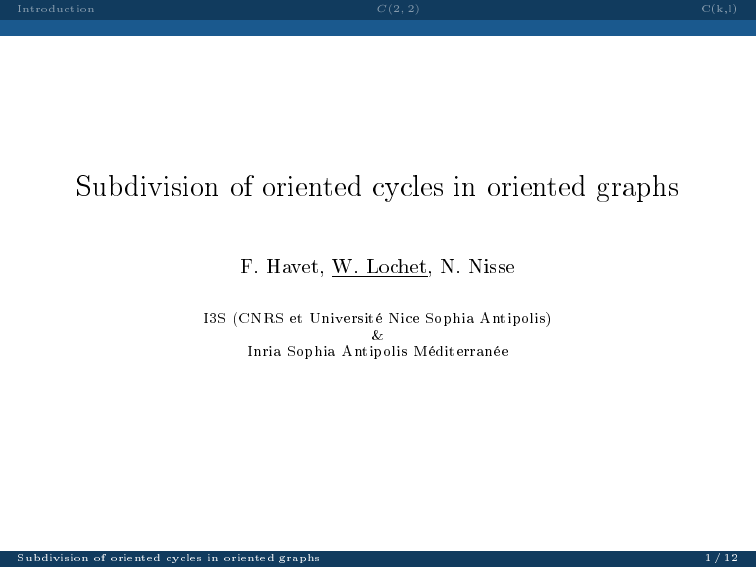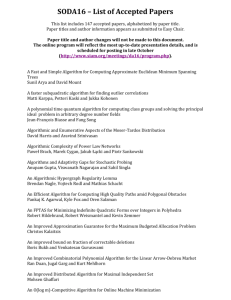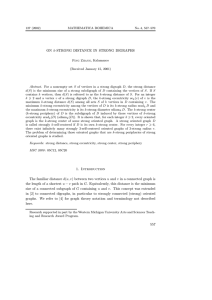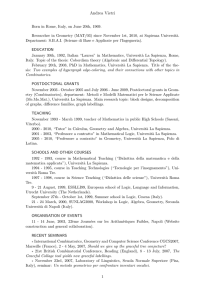Subdivision of oriented cycles in oriented graphs &
advertisement

Introduction
C(2, 2)
C(k,l)
Subdivision of oriented cycles in oriented graphs
F. Havet, W. Lochet, N. Nisse
I3S (CNRS et Université Nice Sophia Antipolis)
&
Inria Sophia Antipolis Méditerranée
Subdivision of oriented cycles in oriented graphs
1 / 12
Introduction
C(2, 2)
C(k,l)
Orientation and colouring
Denition
The chromatic number, χ(D) of a digraph D is the chromatic number
of its underlying graph.
Subdivision of oriented cycles in oriented graphs
2 / 12
Introduction
C(k,l)
C(2, 2)
Orientation and colouring
Denition
The chromatic number, χ(D) of a digraph D is the chromatic number
of its underlying graph.
Theorem (Gallai-Hasse-Roy-Vitaver)
χ(D) = k ⇒
D has a directed path with
Subdivision of oriented cycles in oriented graphs
k
vertices.
2 / 12
Introduction
C(k,l)
C(2, 2)
Orientation and colouring
Denition
The chromatic number, χ(D) of a digraph D is the chromatic number
of its underlying graph.
Theorem (Gallai-Hasse-Roy-Vitaver)
χ(D) = k ⇒
•
D has a directed path with
k
vertices.
Transitive tournaments: high chromatic number but no directed
cycle.
Subdivision of oriented cycles in oriented graphs
2 / 12
Introduction
C(k,l)
C(2, 2)
Orientation and colouring
Denition
The chromatic number, χ(D) of a digraph D is the chromatic number
of its underlying graph.
Theorem (Gallai-Hasse-Roy-Vitaver)
χ(D) = k ⇒
•
D has a directed path with
k
vertices.
Transitive tournaments: high chromatic number but no directed
cycle.
Theorem (Bondy)
D
is strong,
χ(D) = k ⇒
D has a directed cycle with at least
k
vertices.
Subdivision of oriented cycles in oriented graphs
2 / 12
Introduction
C(2, 2)
C(k,l)
Blocks
Denition
In an oriented path or cycle, a
block
is a maximal directed sub-path.
Figure : A path with 2 blocks.
Subdivision of oriented cycles in oriented graphs
3 / 12
Introduction
C(k,l)
C(2, 2)
Blocks
Denition
In an oriented path or cycle, a
block
is a maximal directed sub-path.
Figure : A path with 2 blocks.
Theorem (L.Addario-Berry, F.Havet and S. Thomassé)
If
χ(D) = k ,
then
D
contains every path with 2 blocks on
Subdivision of oriented cycles in oriented graphs
k
vertices.
3 / 12
Introduction
C(k,l)
C(2, 2)
Blocks
Denition
In an oriented path or cycle, a
block
is a maximal directed sub-path.
Figure : A path with 2 blocks.
Theorem (L.Addario-Berry, F.Havet and S. Thomassé)
If
χ(D) = k ,
then
D
contains every path with 2 blocks on
k
vertices.
Lemma (Gyárfás, Thomassen)
There exists oriented graph
Di
Di
such that
χ(Di ) ≥ i
and every cycle in
has at least four blocks.
Subdivision of oriented cycles in oriented graphs
3 / 12
Introduction
C(k,l)
C(2, 2)
Conjecture (L. Addario-Berry et al.)
k and l, there exists an integer α(k, l) such that :
χ(D) > α(k, l) and D strong ⇒ D contains an oriented cycle
two blocks, one of length at least k , and the other at least l .
For all
with
k
l
Figure : Cycle with two blocks.
This can be seen as nding a subdivision of C(k, l) the cycle with one
block of size k and one block of size l.
Subdivision of oriented cycles in oriented graphs
4 / 12
Introduction
C(k,l)
C(2, 2)
Results
We showed the following:
Theorem
α(1, 2) = α(2, 2) = α(1, 3) = 4, α(2, 3) = 5
and
α(3, 3) ≤ 7.
Where α(k, l) is the smallest integer such that:
D strong and χ(D) > α(k, l) ⇒ D contains a subdivision of C(k, l).
Subdivision of oriented cycles in oriented graphs
5 / 12
Introduction
C(k,l)
C(2, 2)
Results
We showed the following:
Theorem
α(1, 2) = α(2, 2) = α(1, 3) = 4, α(2, 3) = 5
and
α(3, 3) ≤ 7.
Where α(k, l) is the smallest integer such that:
D strong and χ(D) > α(k, l) ⇒ D contains a subdivision of C(k, l).
Theorem
Let
D
be a
2-strong
χ(D) ≥ (k + l − 2)(k − 1) + 2,
C(k, l).
digraph. If
contains a subdivision of
Subdivision of oriented cycles in oriented graphs
then
D
5 / 12
Introduction
C(2, 2)
C(k,l)
Handle decomposition
Denition
F a subgraph of D. A handle h of F is a directed path of D which
meets F only at its ends.
Subdivision of oriented cycles in oriented graphs
6 / 12
Introduction
C(2, 2)
C(k,l)
Handle decomposition
Denition
F a subgraph of D. A handle h of F is a directed path of D which
meets F only at its ends.
Denition
A
handle decomposition of D starting at v ∈ V (D) is a triple
(v, (hi )1≤i≤p , (Di )0≤i≤p ), where (Di )0≤i≤p is a sequence of strongly
connected digraphs and (hi )1≤i≤p is a sequence of handles such that:
• V (D0 ) = {v},
for 1 ≤ i ≤ p, hi is a handle of Di and Di is the (arc-disjoint)
union of Di−1 and hi , and
• D = Dp .
•
Subdivision of oriented cycles in oriented graphs
6 / 12
Introduction
C(2, 2)
C(k,l)
Handle decomposition
v0
Figure :
Subdivision of oriented cycles in oriented graphs
D0 = {v0 }
7 / 12
Introduction
C(2, 2)
C(k,l)
Handle decomposition
v0
Figure :
Subdivision of oriented cycles in oriented graphs
D1 = D0 ∪ h1
7 / 12
Introduction
C(2, 2)
C(k,l)
Handle decomposition
v0
Figure :
Subdivision of oriented cycles in oriented graphs
D2 = D1 ∪ h2
7 / 12
Introduction
C(2, 2)
C(k,l)
Handle decomposition
v0
Figure :
Subdivision of oriented cycles in oriented graphs
D3 = D2 ∪ h3
7 / 12
Introduction
C(2, 2)
C(k,l)
Handle decomposition
v0
Theorem
Every strong digraph admits a handle decomposition.
Subdivision of oriented cycles in oriented graphs
7 / 12
Introduction
C(k,l)
C(2, 2)
Theorem
D be a
C(2, 2).
Let
of
strong digraph. If
Subdivision of oriented cycles in oriented graphs
χ(D) ≥ 4
then
D
contains a subdivision
8 / 12
Introduction
C(k,l)
C(2, 2)
Theorem
D be a
C(2, 2).
Let
of
strong digraph. If
χ(D) ≥ 4
then
D
contains a subdivision
Consider a handle decomposition that maximizes the sequence of the
length of the handles with respect to the lexicographic order.
Let q be the largest index such that hq is not trivial.
Subdivision of oriented cycles in oriented graphs
8 / 12
Introduction
C(k,l)
C(2, 2)
Theorem
D be a
C(2, 2).
Let
of
strong digraph. If
χ(D) ≥ 4
then
D
contains a subdivision
Consider a handle decomposition that maximizes the sequence of the
length of the handles with respect to the lexicographic order.
Let q be the largest index such that hq is not trivial.
Case q 6= 1
hq
s
t
hr with r < q
Figure :
Subdivision of oriented cycles in oriented graphs
hq
is an
(s, t)
dipath
8 / 12
Introduction
C(k,l)
C(2, 2)
Theorem
D be a
C(2, 2).
Let
of
strong digraph. If
χ(D) ≥ 4
then
D
contains a subdivision
Consider a handle decomposition that maximizes the sequence of the
length of the handles with respect to the lexicographic order.
Let q be the largest index such that hq is not trivial.
Case q 6= 1
s
t
h0r
Figure :
Subdivision of oriented cycles in oriented graphs
h0r
is longer than
hr
8 / 12
Introduction
C(k,l)
C(2, 2)
Theorem
D be a
C(2, 2).
Let
of
strong digraph. If
χ(D) ≥ 4
then
D
contains a subdivision
Consider a handle decomposition that maximizes the sequence of the
length of the handles with respect to the lexicographic order.
Let q be the largest index such that hq is not trivial.
Case q = 1
Figure : 2 crossing chords
Subdivision of oriented cycles in oriented graphs
8 / 12
Introduction
C(k,l)
C(2, 2)
Theorem
D be a
C(2, 2).
Let
of
strong digraph. If
χ(D) ≥ 4
then
D
contains a subdivision
Consider a handle decomposition that maximizes the sequence of the
length of the handles with respect to the lexicographic order.
Let q be the largest index such that hq is not trivial.
Case q = 1
Figure : A subdivision of
Subdivision of oriented cycles in oriented graphs
C(2, 2)
8 / 12
Introduction
C(k,l)
C(2, 2)
Theorem
Let
D
be a
2-strong
χ(D) ≥ (k + l − 2)(k − 1) + 2,
C(k, l).
digraph. If
contains a subdivision of
Subdivision of oriented cycles in oriented graphs
then
D
9 / 12
Introduction
C(k,l)
C(2, 2)
Theorem
Let
D
be a
2-strong
χ(D) ≥ (k + l − 2)(k − 1) + 2,
C(k, l).
digraph. If
contains a subdivision of
then
D
Assume k > l and pick u any vertex. Let Li = {v|distD (u, v) = i}.
If v ∈ Lk we have a subdivision of C(k, k). If Lk = ∅,
V (D) = {u} ∪ L1 ∪ · · · ∪ Lk−1 .
u
L1
L2
Subdivision of oriented cycles in oriented graphs
Lk−1
9 / 12
Introduction
C(k,l)
C(2, 2)
Theorem
Let
D
be a
2-strong
χ(D) ≥ (k + l − 2)(k − 1) + 2,
C(k, l).
digraph. If
contains a subdivision of
then
D
Assume k > l and pick u any vertex. Let Li = {v|distD (u, v) = i}.
If v ∈ Lk we have a subdivision of C(k, k). If Lk = ∅,
V (D) = {u} ∪ L1 ∪ · · · ∪ Lk−1 .
u
L1
χ(D) ≤ 1 +
P
i
L2
Lk−1
χ(Li ), so there exists i, with χ(Li ) ≥ (k + l − 1).
Subdivision of oriented cycles in oriented graphs
9 / 12
Introduction
C(k,l)
C(2, 2)
Because χ(Li ) ≥ (k + l − 1), there exists a path with two blocks, one
of length k, the other of length l − 1.
v2
u
v1
Li
Figure : Path of two blocks in
Subdivision of oriented cycles in oriented graphs
Li
10 / 12
Introduction
C(k,l)
C(2, 2)
Because χ(Li ) ≥ (k + l − 1), there exists a path with two blocks, one
of length k, the other of length l − 1.
v2
u0
u
v1
Li
Figure : Subdivision of
Subdivision of oriented cycles in oriented graphs
C(k, l)
10 / 12
Introduction
C(k,l)
C(2, 2)
Open questions
Question
Prove the existence of
α(k, l)
Subdivision of oriented cycles in oriented graphs
for all
k
and
l.
11 / 12
Introduction
C(k,l)
C(2, 2)
Open questions
Question
Prove the existence of
α(k, l)
for all
k
and
l.
We proved it for small k and l and in the case 2 strong.
Subdivision of oriented cycles in oriented graphs
11 / 12
Introduction
C(k,l)
C(2, 2)
Open questions
Question
Prove the existence of
α(k, l)
for all
k
and
l.
We proved it for small k and l and in the case 2 strong.
Question (More than two blocks)
C
has more than two blocks
•
Counter example in the non-strong case.
•
Which connectivity condition is necessary.
•
Under these conditions what chromatic number is needed.
Subdivision of oriented cycles in oriented graphs
11 / 12
Introduction
C(k,l)
C(2, 2)
Open questions
Question
Prove the existence of
α(k, l)
for all
k
and
l.
We proved it for small k and l and in the case 2 strong.
Question (More than two blocks)
C
has more than two blocks
•
Counter example in the non-strong case.
•
Which connectivity condition is necessary.
•
Under these conditions what chromatic number is needed.
Proposition
χ(D) > 12
and
D
strong
⇒D
contains a subdivision of a cycle with
4
blocks.
Subdivision of oriented cycles in oriented graphs
11 / 12
Introduction
C(2, 2)
C(k,l)
Thank you!
Subdivision of oriented cycles in oriented graphs
12 / 12




